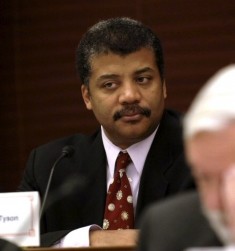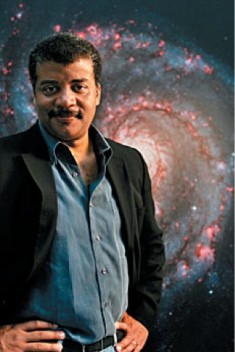| Neil deGrasse Tyson | |
|---|---|
 |
|
| Astrophysicist | |
| Specialty | Astrophysics, science communication, physical cosmology |
| Born | Oct. 5, 1958 Manhattan, New York City, United States |
| Nationality | American |
Neil deGrasse Tyson is a world renowned astrophysicist and director of Hayden Planetarium at the Rose Center for Earth and Space. He is a science communicator and has hosted the educational science television show NOVA Science Now on PBS. He is an award-winning author and has authored seven books. He is a renowned speaker with a quick wit and fierce intelligence.
Early and Educational Years
On October 5, 1958, Neil deGrasse Tyson was born in the city of New York. He was raised in the Bronx by his parents. Cyril deGrasse Tyson, his father, was an activist and a sociologist, and Sunchita Feliciano Tyson, his mother, was a housewife who later earned a Master’s Degree in gerontology.
He completed his early studies from Bronx High School and attended Harvard University, where he majored in physics. In addition to his strong obsession for astrophysics, Neil was active in other extracurricular activities, including dancing, rowing, and wrestling. In 1983, he earned a Master of Arts in astronomy from the University of Texas at Austin. Neil Tyson’s interest did not stop there and he obtained his Ph.D. from Columbia in Astrophysics.
Neil deGrasse gained an interest in the stars when he visited the Hayden Planetarium at the tender age of nine. At that age, he decided nothing would stop him from exploring the universe. In junior high school, frequent nighttime trips with telescopes to the apartment rooftop often lead to uninformed neighbors calling the police to report suspicious behavior. At the young age of 14, Neil traveled to South Africa to observe a total solar eclipse off the coast. This was done with the help of the Director of Education of the club who offered a small scholarship from the Explorer’s Club of New York.
Professional Life
 Neil deGrasse Tyson played multiple roles during his career. He dons many hats in his work life, such as that of a scientist, researcher, academician, writer, TV personality and many more. He has held various positions in institutions such as Princeton University, the University of Maryland, the Hayden Planetarium and the American Museum of Natural History.
Neil deGrasse Tyson played multiple roles during his career. He dons many hats in his work life, such as that of a scientist, researcher, academician, writer, TV personality and many more. He has held various positions in institutions such as Princeton University, the University of Maryland, the Hayden Planetarium and the American Museum of Natural History.
After earning his doctorate, Dr. Tyson worked as a research scientist and astrophysicist at Princeton University. He also worked as columnist for a magazine called Stardate. He went on to become the director of the Hayden Planetarium of New York. Tyson was the youngest ever to become director of the planetarium. Tyson’s research has been focused on cosmology, galactic astronomy, stellar evolution, stellar formation and bulges.
As director of the planetarium, Tyson worked extensively towards renovation of the facility, from assisting in its design to raising funds. He also attracted a bit of controversy here when he removed the planet Pluto from the display of planets. He went against the common thought that considered Pluto as the ninth planet of the solar system. He termed Pluto as a dwarf planet, which many objected to. He even received several hate mails for this, primarily from kids, as this was not a popular change he was suggesting. However, later on in 2006, the International Astronomical Union took cues from Tyson and officially termed Pluto as a dwarf planet.
Publications and Various Honors
Dr. Tyson has written a number of books on astronomy, which have been quite popular. He wanted to improve scientific literacy amongst people and wanted to bring universe down to earth. Some of his popular books include Death by Black Hole, The Pluto Files: The Rise and Fall of America’s Favorite Planet, and Other Cosmic Quandaries.
Dr. Tyson also has the distinction of serving as the presidential advisor. In 2001, President George Bush also assigned him on to a commission on future of aerospace industry. Three years down the line, he also served another commission to examine policies of United States on space exploration.
Tyson commands deep respect amongst people and he is considered to be a favorite by media, especially when it comes to crucial science topics. He has the ability to make ordinary people understand difficult science concepts. His strong oratory skills and remarkable sense of humor made him a popular face on television.
He has been on TV shows such as The Colbert Report, The Daily Show and Real Time with Bill Maher. He also hosts a podcast known as StarTalk. Tyson is also involved in bringing back the classic science documentary named Cosmos to the TV, which will throw light on the origin of life and the universe.